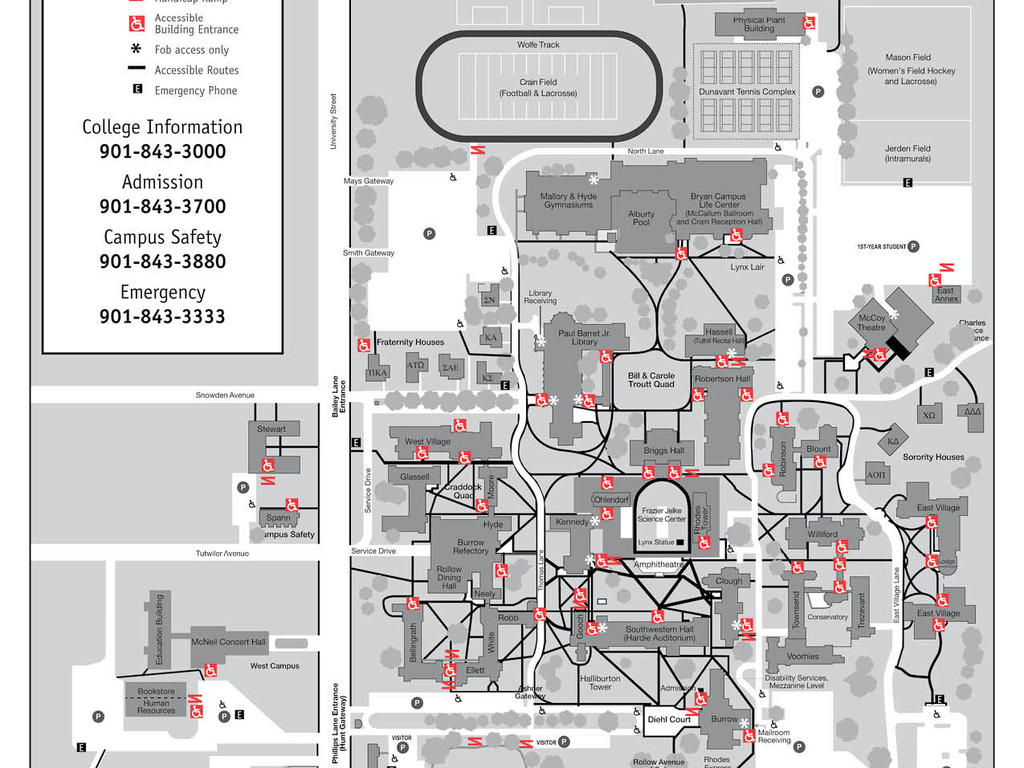This past year, Student Disability Services adopted a new name to better reflect their mission of promoting access and inclusion for all students, in all aspects of campus life: Student Accessibility Services (SAS). The name-change follows a national trend among higher education institutions that reflects a shift away from the medical model of disability toward the social justice model. The change embodies a more positive, active attitude toward expanding accessibility and counteracts the stigma society often attaches to the word “disability.”
“Disability is just one aspect of diversity in life, and if we can make things accessible for everyone, then we’re doing the right thing at the end of the day,” says Melissa Butler, director of Student Accessibility Services.
Will Jirik ’18, who sustained a spinal cord injury in an accident following his first-year at Rhodes, regards the emphasis on ‘accessibility’ as reflective of accessibility advocacy nationwide. “I was just up in New York. That state has changed their handicap logo from the old wheelchair just sitting there to one having more of an active, forward motion, which is pretty cool,” Jirik says. “It’s about how to make it possible.” He adds that his graduation experience, from the crossing of the seal in Palmer Hall to the three-hour ceremony in Fisher Memorial Garden, was a more fully accessible event thanks to SAS and their collaboration with College Events and Physical Plant.
Though physical accessibility may be the most obvious sign of SAS’s impact on campus (view our accessibility map here), Butler also works with students who require academic accommodations and with faculty members to make their syllabi and exams accessible and intuitive to a broader range of learners.
Assistant professor of chemistry Dr. Shana Stoddard believes in the power of promoting accessibility in the classroom. Having received academic accommodations during graduate school, Stoddard is a strong proponent of implementing the concept of Universal Design for Learning in her classes.
Universal Design includes practices as simple as using cooperative learning activities, organizing lectures using visual and verbal clues, and using varying forms of assessing student achievement. Universal Design caters to all kinds of learners, not just those registered to receive academic accommodations.
“The whole idea of Universal Design is that it’s accessible to everybody with as few adaptations as possible,” Stoddard says. “The idea is that everyone will be able to learn in the same environment, because these kinds of resources are helpful for everybody.”
Universal Design and SAS share a focus of promoting accessibility for everyone rather than dealing with disability, and Stoddard believes that this encourages students to seek the resources they need to succeed academically.
“SAS is there to provide access for students, and I think the name change helps students want to come out and identify themselves, because it’s not a ‘disability,’” says Stoddard. “Why is it a disability to have ADHD? It’s not, it’s just a different way that your brain works.”
The population of students registered with SAS is currently at 14%, and growing, but you often may not notice them. “At Rhodes, disability is primarily hidden, so you don’t usually see it,” Butler says. “We have a very small number of students with visible conditions, so that makes it a little more challenging to promote that awareness—because if you don’t see it, then it must not be here. But that’s not the case.”
According to Butler, the student feedback on the name change has been overwhelmingly positive. With disability advocacy groups on campus growing and SAS continuing to find innovative ways to meet the needs of all students and faculty, the Rhodes campus is becoming a more inclusive, diverse, and accessible community.
By Jaclyn Flood '21
